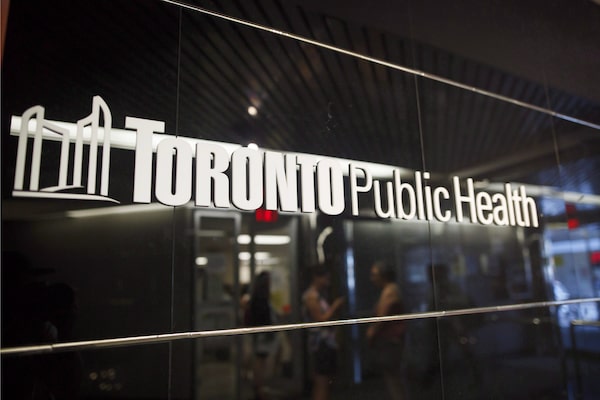
Toronto board of health chairman Joe Cressy and Mayor John Tory warned that Toronto Public Health believed it was facing rising massive cuts.Cole Burston/The Canadian Press
Provincial cuts to public-health units across Ontario will not endanger front-line services, Ontario Minister of Health Christine Elliott said Friday, as her officials provided details on plans that had whipped up concern about everything from vaccination checks to food-safety inspections.
The PC government of Ontario Premier Doug Ford has been scrambling to contain the weeklong furor that erupted after Toronto board of health chairman Joe Cressy and Mayor John Tory warned that Toronto Public Health believed it was facing rising massive cuts of $80-million to $100-million a year – and $1-billion over a decade. But until Friday, the province had declined to provide its own detailed figures, which it insisted were nowhere near that large.
"There has been an unfortunate difference of opinion that we are looking to rectify right now, and we look forward to working co-operatively with the city of Toronto,” Ms. Elliott said in a phone interview with The Globe and Mail on Friday.
For days, despite providing little information, Ms. Elliott and other provincial officials accused Mr. Cressy of “fear mongering." The Premier himself targeted the downtown city councillor on Twitter this week, saying that he and “his NDP friends either don’t understand Public Health funding or are intentionally lying to the people” and that Mr. Cressy’s "back of the napkin math is flat-out wrong.”
Mr. Cressy’s math, confirmed by the city manager in a memo to Toronto council, was based on the a conference call last week. The call was on the province’s plans to move from the current public-health funding model, which sees the province cover 75 per cent of most of the city’s public-health programs and 100 per cent of some others, to a 50-50 split. (Health units outside of Toronto, which would be consolidated into just nine entities from 34, would see 60 per cent or 70 per cent of their costs covered.)
On Friday, the government finally offered its own numbers to reporters. Even then, government officials at first insisted on sharing the information through off-the-record briefings. In an interview with The Globe late on Friday, Ms. Elliott’s director of policy, Charles Lammam, explained the province’s plan, which he said was still subject to discussions with Toronto officials.
He said the province would move Toronto’s Public Health’s budget to a 60-40 ratio this year, retroactively, as of April 1, as it transitions to the 50-50 model. But the province is insisting the current pot of money for cost-shared programs, which is pegged at $190-million, should remain the same.
That means the cheque from Queen’s Park would shrink from $147-million to $114-million. The city would need to add $33-million to the $43-million it currently spends, for a total city contribution of $76-million, to keep the overall funding level the same. By 2021, the city would be required to cover a total of $84-million for its portion of the public-health budget, Mr. Lammam said.
Toronto’s budget chief, Councillor Gary Crawford – once floated as a Tory MPP candidate – issued a statement on Friday saying the city still disputes the province’s figures, and that finding any extra money $33-million in a city budget passed months ago was “simply not possible.”
On Friday, Mr. Cressy, Mr. Tory and Eileen de Villa, Toronto’s medical officer of health, all said they still had received no written information on the province’s numbers, even though a week had gone by since the controversy began. Officials have engaged in discussions, however.
“They are making this up as they go,” Mr. Cressy said.
Mr. Tory, who has, like Mr. Cressy, warned the cuts put lives at risk, did not mince words about the dispute on Friday morning: “We have never received a shred of paper, not a matchbook cover, from the government of Ontario indicating how they’ve done their calculations that take issue with ours."
Ms. Elliott acknowledged late on Friday that written material had just been sent to the mayor’s office that day. But she also insisted that information provided as long ago as April 15 should have made the province’s intentions clear.
 Jeff Gray
Jeff Gray